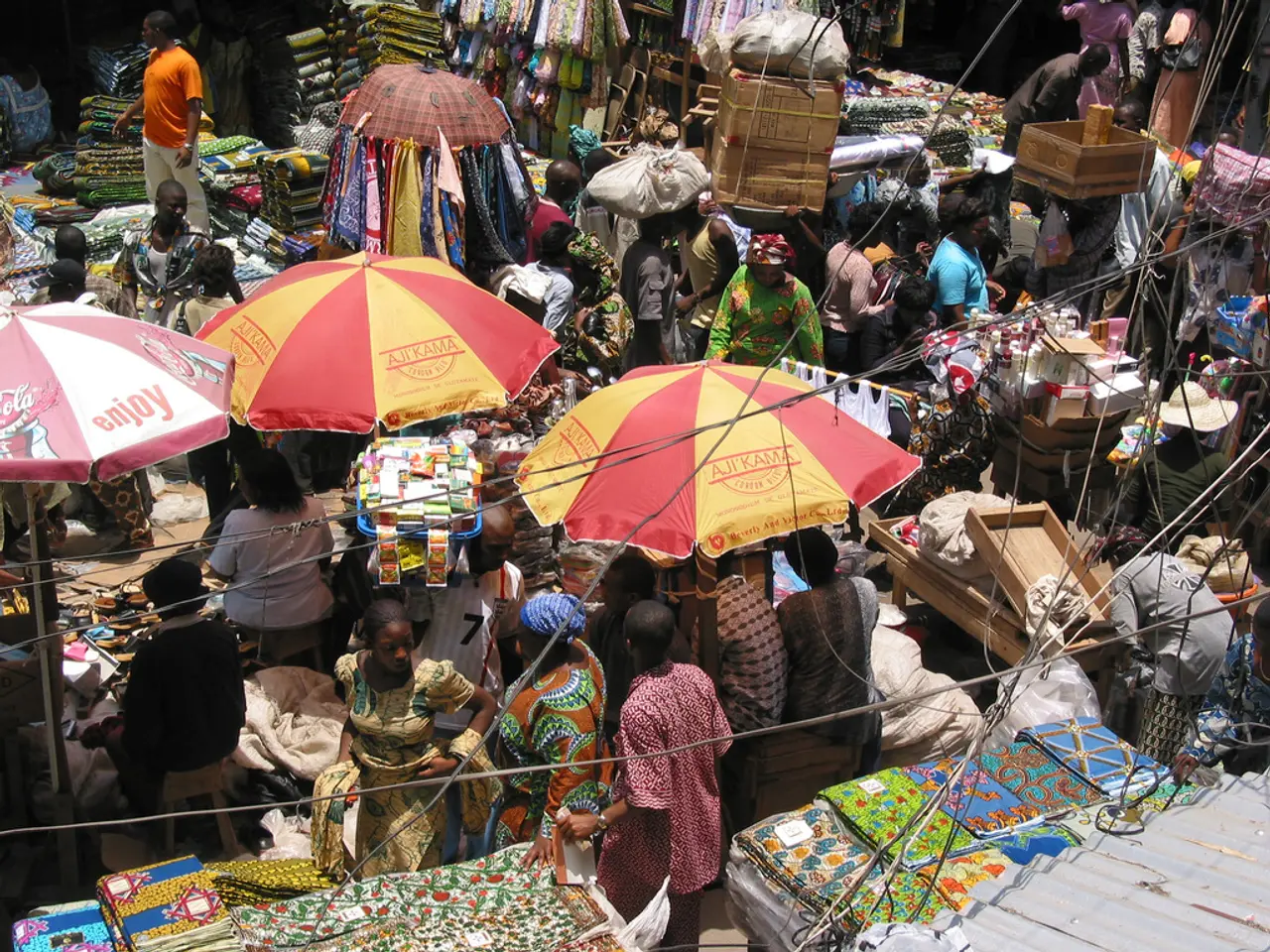Algeria Prohibits All Cryptocurrency Operations, Encompassing Possession and Mining Processes
In a move that goes against the global trend of increasing cryptocurrency liberalization, the Algerian government has expanded its ban on all crypto-related activities. This decision was made due to concerns over money laundering, terrorism financing, and illegal mining exploiting subsidized electricity [1][2][3].
The new law, formalized as Law no. 25-10 on July 24, 2025, criminalizes any activity involving cryptocurrencies, including trading, ownership, mining, issuance, promotion, and the offering of crypto-trading services. Violations of the law could result in prison sentences ranging from two to 12 months and fines between 200,000 and 1 million Algerian dinars (approximately $1,500 to $7,700) [1][2][3][4][5].
The ban, which extends and expands the 2018 Financial Law, is a crypto-focused amendment to the 2005 law on Preventing Money Laundering and Financing Terrorism. However, experts like Ari Redbord and Matthias Bauer-Langgartner question the effectiveness of broad-based restrictions on cryptocurrency activity. They argue that such bans tend to drive the ecosystem underground, fuelling gray markets where users lack safeguards and protections [3].
Redbord suggests that regulation that brings activity into the light is a more effective approach. Regulation that grants trading platforms legitimacy in exchange for complying with standards of transparency could be more productive, according to Redbord [6].
Despite the ban, Algeria ranks as the 6th largest country in the Middle East and North Africa region by cryptocurrency value received, according to Chainalysis' 2024 Geography of Cryptocurrency Report. This indicates that the crypto market in Algeria has grown considerably since the government banned crypto trading and ownership in January 2018 [7].
The Financial Action Task Force (FATF) reported in a June update that broad-based bans are difficult to enforce, making it harder for law enforcement agencies to track and ringfence illicit activity [2]. The ban also poses challenges in terms of enforcement, as some users might try evading the ban by using VPNs to access foreign crypto platforms, which is also illegal under the new law.
The ban could stifle technological innovation and financial inclusion, isolating Algeria from the growing digital economy embraced by other nations. Furthermore, shutting down mining operations may impact illegal electricity usage but could also limit local economic opportunities in the emerging crypto sector [3].
In summary, Algeria's strict prohibition aims to control illicit financial flows and energy misuse but risks hindering innovation and pushing crypto activity underground, potentially complicating regulation and enforcement efforts [1][3]. Even countries like China, which previously had a hardline policy towards crypto, have announced a shift in their policy. As the world continues to grapple with the implications of decentralized finance, it remains to be seen how Algeria's approach will fare in the long run.
References: [1] Al Jazeera. (2025). Algeria bans all cryptocurrency activities. Retrieved from https://www.aljazeera.com/news/2025/7/24/algeria-bans-all-cryptocurrency-activities [2] Financial Action Task Force. (2024). FATF June update highlights challenges in enforcing broad-based bans on cryptocurrency activity. Retrieved from https://www.fatf-gafi.org/publications/fatfrecommendations/documents/fatf-june-update-highlights-challenges-in-enforcing-broad-based-bans-on-cryptocurrency-activity.html [3] Redbord, A. (2025). Outright bans on cryptocurrency activity are ineffective and risk pushing activity underground. Retrieved from https://www.coindesk.com/opinion/2025/07/15/outright-bans-on-cryptocurrency-activity-are-ineffective-and-risk-pushing-activity-underground/ [4] Chainalysis. (2024). Algeria ranks 6th in the Middle East and North Africa region by cryptocurrency value received. Retrieved from https://reports.chainalysis.com/reports/geography-of-cryptocurrency-2024/algeria [5] The North Africa Post. (2025). Algeria's new law on cryptocurrency: What you need to know. Retrieved from https://northafricapost.com/algerias-new-law-on-cryptocurrency-what-you-need-to-know/ [6] Redbord, A. (2025). Regulation, not outright bans, is the key to controlling cryptocurrency. Retrieved from https://www.coindesk.com/opinion/2025/07/20/regulation-not-outright-bans-is-the-key-to-controlling-cryptocurrency/ [7] Bauer-Langgartner, M. (2025). Broad-based bans on cryptocurrency activity are very challenging to effectively implement. Retrieved from https://www.cnbc.com/2025/07/24/broad-based-bans-on-cryptocurrency-activity-are-very-challenging-to-effectively-implement.html
- The Algerian government's expansion of its ban on cryptocurrency-related activities includes restrictions on trading, ownership, mining, issuance, promotion, and the offering of crypto-trading services.
- Violations of the new law, Law no. 25-10, could result in prison sentences and fines.
- Experts like Ari Redbord and Matthias Bauer-Langgartner question the effectiveness of broad-based restrictions on cryptocurrency activity, arguing that they push the ecosystem underground and create gray markets.
- Regulation that brings activity into the light, such as granting trading platforms legitimacy in exchange for standards of transparency, is a more effective approach, according to Redbord.
- Despite the ban, Algeria ranks as the 6th largest country in the Middle East and North Africa region by cryptocurrency value received, suggesting the crypto market in Algeria has grown since the government banned crypto trading and ownership in January 2018.
- The Financial Action Task Force (FATF) reports that broad-based bans are difficult to enforce, making it harder for law enforcement agencies to track and ringfence illicit activity.
- The ban could stifle technological innovation, financial inclusion, and local economic opportunities in the emerging crypto sector.
- As the world grapples with the implications of decentralized finance, it remains to be seen how Algeria's approach will fare in the long run, with some countries like China announcing a shift in their policy towards cryptocurrency.




